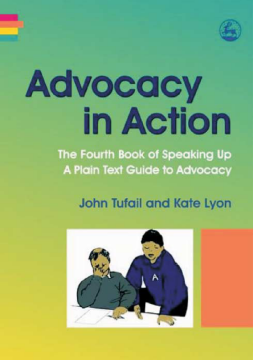
Additional Information
Book Details
Abstract
Advocacy for people with disabilities is widely practised, but what about self-advocacy? How often do parents or carers speak 'for' you and prevent you being heard? Do you know your rights within advocacy law? The four books in the Speaking Up set were conceived and written specifically to promote self-advocacy to disabled individuals who want to learn how to speak up for themselves.
This fourth book in the series looks at problems that can occur in an advocacy partnership, such as dependency on the advocate and conflict between partners. It also discusses advocacy and the law.
All four books are illustrated throughout with colour drawings and case studies showing the positive results of self-advocacy on the individuals themselves, as well as on their families and carers.
This empowering training package encourages an equal partnership between the advocate and the user where the shared goal is to develop the life skills of the individual with learning difficulties. It is accessible to people with a wide range of literacy needs, including those with high learning needs and is designed for use in formal and informal learning situations, either unsupported or with a facilitator present.
The Four Books in this series; 'Introducing Advocacy', 'Rules and Standards', 'Listen Up!' and 'Advocacy in Action' are comprehensive, informative and quite simply a very good introduction for someone new to the world of advocacy.
Practice Links in Social Work
This fourth volume in a four-volume training set builds on the skills of the first three, giving people with disabilities and their advocacy partners basic information on situations that can arise in or in spite of advocacy. This starts with a narrative/case study of a person with a disabilty who was incorrectly treated but, through the advocacy of her family, eventially received more appropriate care. It describes how to make an effective advocacy plan, how to detect and correct problems in the relationship or actions of people with disabilities, how to get caregivers and others to let people with disabilities speak for themselves, and how to handle conflict and communication issues.
Book News.com
The authors have the rare ability of striking just the right balance between keeping things simple while covering all of the key topics without being patronising.
The format is very easy to follow, well spaced out and principles are illustrated with basic pictures. Chapters can be read individually and include real life examples with suggested questions for discussion.
The series would make an excellent supplement to volunteer training sessions or be useful pre-reading for those new to advocacy before attending training. More experienced practitioners will also benefit from reviewing an individual chapter before working with service users to obtain a quick refresher of the key principles.
Community Care
John Tufail and Kate Lyon are directors of People's Advocacy Network in Wellington, New Zealand. John Tufail has over 30 years' experience working in the disability sector, specialising in high communication needs. Since the 1980s, he has been increasingly involved in developing advocacy services. John has been lead investigator on a number of research projects into advocacy provision, both in the UK and internationally, and was central to the development of the UK's first university advocacy course at the University of East London. Kate Lyon is a self-employed graphic designer and web-page designer and the winner of four industry awards. She runs her own learning and design company, Merlin Design.
Table of Contents
| Section Title | Page | Action | Price |
|---|---|---|---|
| Prelims - We Are Millions (Title Page, Copyright Information, Contents, Acknowledgements) | |||
| 1. We Are Millions |
